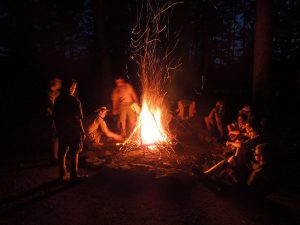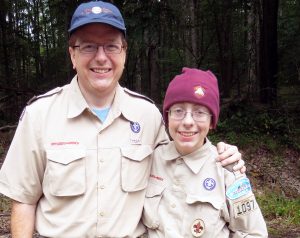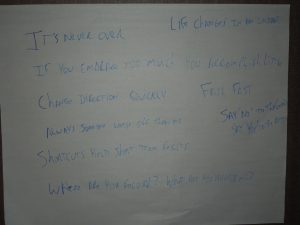 I just got back from Scout Camp with my son. It was a great experience for us, and while Joel gained “mad skillz” in pioneering and first aid, I learned some things too.
I just got back from Scout Camp with my son. It was a great experience for us, and while Joel gained “mad skillz” in pioneering and first aid, I learned some things too.
One of the lessons had to do with my preconceived notions about what it means to be “experienced.”
One of the tenets of scouting is that the boys help each other achieve and learn leadership. Over the course of the week I watched as scouts repeatedly came to the troop scoutmaster asking for his help. Time and again Jon turned them away.
Why did he turn them away? Isn’t it the scoutmaster’s job to teach the boys?
Yes, it is his job to teach them (which he does exceedingly well) and it’s *also* his job to develop leadership skills in the boys.
One specific boy, Ted, was working on trying to build a fire. Jon had spent time with Ted teaching him about how to find good materials, and about the next steps in getting it to burn and stay burning. Jon taught Ted what he needed to know, and then pulled back and let Ted struggle with the process.
When Ted got frustrated, Jon didn’t jump in, but encouraged Ted to seek help from boys who had already mastered that skill.
I took a moment to ask Jon about his approach, and what he said surprised me. He said
“I don’t need to work with him now. There’s plenty of experience around this fire pit to get him those skills.”
“Plenty of experience around this fire pit“? Really? The fire pit was surrounded by a bunch of 12, 13, and 14 year olds. There’s “Plenty of experience” in a bunch of pre-pubescent boys?
Upon reflection, I realized two things:
- Jon was right. Those boys around the fire pit DO have plenty of experience in that particular skill! Boys that age (and Assistant Scoutmasters, too) like to play with the fire, and have started lots of them. They are well equipped to share their experience with others.
- I had some pretty strongly held prejudices about the boys – that they were such apprentices to life that they were not yet prepared to be respected leaders of anyone. I was wrong.
Which leads me to ask:
- What is your prejudice about that team member that you don’t like?
- What about that other department that doesn’t cooperate?
- What story are you telling yourself about them? Are those stories serving you?
Back to the story: Ted didn’t become a master fire builder that trip, but a number of those “experienced” scouts used their fire building experience to help him get better. And that was a lesson for both Ted and to Tom.






